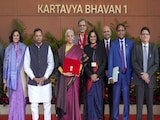Two people were killed after multiple explosions during a prayer meet in Kerala on Sunday. At least three blasts took place just minutes after a prayer meeting of Jehovah's Witnesses began at Kerala's Kalamassery.
Jehovah's Witnesses is a Christian religious denomination known for their distinctive beliefs and practices. They have a presence in more than 240 countries.
Jehovah's Witness: Beliefs
They believe in the importance of God's name, which they refer to as "Jehovah," and they follow a literal interpretation of the Bible. Jehovah's Witnesses are recognised for their door-to-door evangelism, refusal to participate in military service, and their stance on certain medical treatments. They also do not have ordained priests.
Jehovah's Witness: Historical Origins
The origins of Jehovah's Witnesses are traced back to the 18th century in the United States. The movement was founded by Charles Taze Russell, a Bible student and preacher who developed unique interpretations of biblical prophecy and doctrine in the 1870s. He established Zion's Watch Tower Tract Society, later known as the Watch Tower Bible and Tract Society, in 1884, which served as the publishing and organizational arm of the movement. Under Mr Russell's leadership, the movement developed distinctive doctrinal beliefs, and after his death in 1916, leadership passed to Joseph Rutherford, who made significant organizational and doctrinal changes.
Jehovah's Witness: Persecution Under Nazi Regime
During World War II, Jehovah's Witnesses, like Jews, faced persecution under the Nazi regime in Germany. Their steadfast refusal to salute the flag, offer the "Heil Hitler" salute, or engage in activities contrary to their faith made them targets of the Nazi authorities.
Jehovah's Witness: The 1985 Controversy
In 1985, there was a significant school controversy involving Jehovah's Witnesses. Three Jehovah's Witnesses students in Kerala refused to sing the national anthem at a school assembly due to their religious beliefs. This led to their expulsion from school. The matter ended up in the Indian Supreme Court, which ultimately ruled in favour of the students, emphasizing the importance of protecting an individual's right to religious freedom even when it seems to clash with national patriotic rituals.
Jehovah's Witness: Members in India
There are now approximately 4,000 members of Jehovah's Witnesses in Kerala.














